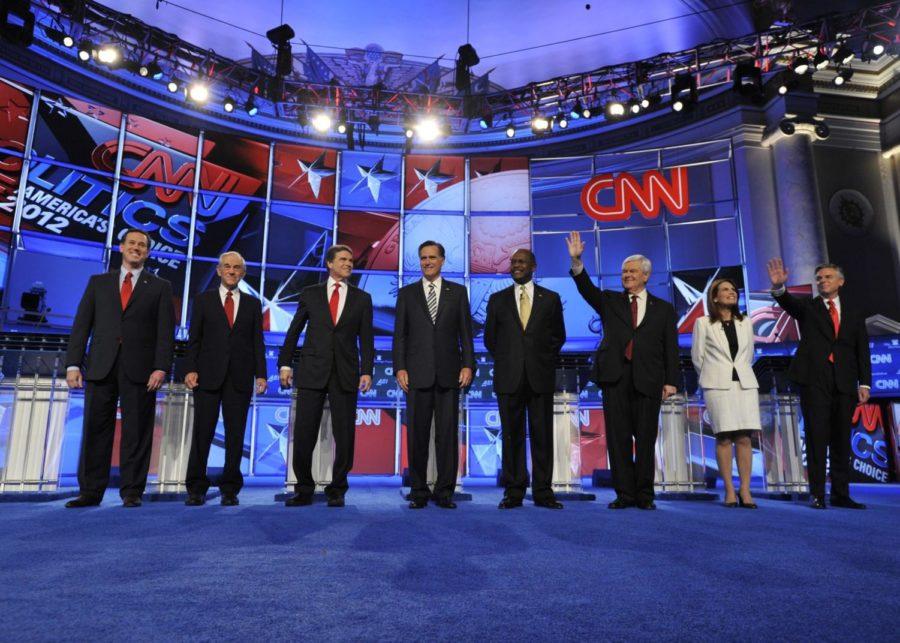437 delegates up for grabs on Super Tuesday 2012
The Republican candidates at the CNN Republican National Security Debate held at Constitution Hall. Left to right: Former Pennsylvania Sen. Rick Santorum, Texas Rep. Ron Paul, Texas Gov. Rick Perry, former Gov. of Massachusetts Mitt Romney, former CEO of Godfather’s Pizza Herman Cain, former Speaker of the House Newt Gingrich, Minnesota Rep. Michele Bachmann and former Gov. of Utah Jon Huntsman.
March 5, 2012
Four hundred thirty-seven delegates are up for grabs as 10 states host a primary or caucus on Super Tuesday.
As one of the most important days of the presidential election race, Super Tuesday is “an early political event when many states hold primaries and caucuses,” said Steffen Schmidt, university professor of political science
The term Super Tuesday has been around for almost 30 years, and the day can, and has, killed many candidates’ campaigns due to the large amount of delegates available.
“The phrase ‘Super Tuesday’ was probably first used in 1984 when there were three clusters of races, so it was called ‘Super Tuesday III,’” Schmidt said.
There is not a specific Super Tuesday date, and the states involved with Super Tuesday change year to year.
“The particular states holding primaries on Super Tuesday have varied from year to year, and who’s in and out is determined by national political party rules, which are constantly changing,” Schmidt said.
Super Tuesday attracted more and more states until reaching its high in 2008’s election. On Feb. 5, 2008, 24 states held primaries or caucuses.
“That year, 52 percent of all pledged Democratic Party delegates and 41 percent of the total Republican Party delegates were selected,” Schmidt said.
This year, however, Super Tuesday is not as big. Only 10 states with a total of 437 delegates are up for grabs. However, that does not change the fact the day is still a big event.
“There are 437 total delegates that are going to be allocated, and that’s way less than four years ago,” said Mack Shelley, university professor of political science. “But we still have over 400 delegates to pick, and that’s more than there has been picked for the other caucuses and primaries so far.”
In terms of delegates, Georgia carries the most weight with 76. Ohio is second with 66, and it is the state where Rick Santorum and Mitt Romney — the two leading candidates — have been focusing their efforts.
“Romney can throw millions of dollars at the drop of a hat into his advertising campaign efforts,” Shelley said. “That’s pretty much what happened in Ohio. Santorum at one point had a 10 or 12 point lead and that’s gone now.”
This state is so important that Santorum’s survivability may hinge on his winning or losing.
“If Santorum can’t come out ahead in Ohio, it’s really almost impossible to see how he would have a path to the nomination,” Shelley said.
Another state to watch is Virginia. Both Newt Gingrich and Rick Santorum did not manage to get onto the ballot because they did not file the correct paperwork. This leaves only Romney and Ron Paul competing, although the results are pretty clear.
“Romney is going to clean up with close to a two-to-one margin, if not more,” Shelley said.
Gingrich has been focusing on his home state of Georgia, where he is ahead and expected to win.
“He is guaranteed to win Georgia, meaning that if he didn’t, it is only a death bell for his campaign,” Shelley said.
If Gingrich fails to win, his main financial backer Sheldon Adelson, a billionaire casino owner, may pull his backing, which would spell Gingrich’s doom.
The current leader, Romney, should expand his lead, Shelley said.
“Romney is likely come away with the majority, maybe half a dozen of those states,” Shelley said.
This year’s Super Tuesday will not likely announce a clear winner or loser.
“I say take Super Tuesday 2012 with a huge, gigantic grain of salt,” Schmidt said. “Because it very likely will change nothing.”







